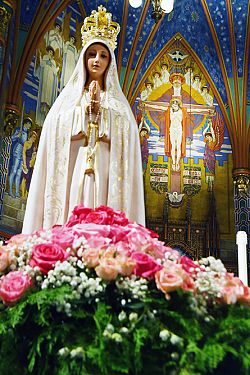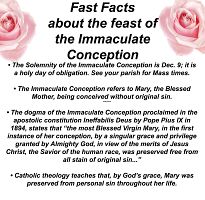Solemnity of the Immaculate Conception of Mary on Dec. 9 is a holy day of obligation

SALT LAKE CITY — On Dec. 9, the Church will celebrate the solemnity of The Immaculate Conception, one of the many feast days that honor Mary, the Mother of God. It is one of three holy days of obligation associated with the Blessed Mother; the other two are the solemnity of Mary, the Holy Mother of God, on Jan. 1 and the solemnity of the Assumption on Aug. 15.
Catholic theology teaches that, by God’s grace, Mary was preserved from personal sin from the moment she was conceived and throughout her life; it is this belief that gave rise to the dogma of the Immaculate Conception. This dogma was promulgated by Pope Pius IX in his 1894 apostolic constitution Ineffabilis Deus, which states that “the most Blessed Virgin Mary, in the first instance of her conception, by a singular grace and privilege granted by Almighty God, in view of the merits of Jesus Christ, the Savior of the human race, was preserved free from all stain of original sin...”
This teaching draws from the Council of Trent, Church tradition, Scripture and other authoritative sources, which Ineffabilis Deus enumerates.
The U.S. Conference of Catholic Bishops explains the Immaculate Conception this way: “In anticipation that she was to bear the Son of God, Mary was preserved from the time of her conception from Original Sin. We call this the Immaculate Conception. No sin would touch her, so that she would be a fitting and worthy vessel of the Son of God.”
Pope John Paul II reinforced this teaching in his 1987 encyclical Redemptoris Mater by writing, “ In this way, from the first moment of her conception – which is to say of her existence – she belonged to Christ, sharing in the salvific and sanctifying grace and in that love which has its beginning in the ‘Beloved,’ the Son of the Eternal Father, who through the Incarnation became her own Son. …”
A common misperception is that the Immaculate Conception refers to Christ, but the USCCB emphasizes that instead it refers “to Mary’s being conceived without inheriting Original Sin.”
Despite her Immaculate Conception, Mary “was not made exempt from the temporal penalties of Adam – from sorrow, bodily infirmities and death,” Catholic Encyclopedia states.
Like all other humans, Mary was granted salvation through the actions of Jesus, but she holds a high station, as Lumen gentium, the Dogmatic Constitution on the Church, notes: “Redeemed by reason of the merits of her Son and united to him by a close and indissoluble tie, she is endowed with the high office and dignity of being the Mother of the Son of God, by which account she is also the beloved daughter of the Father and the temple of the Holy Spirit. Because of this gift of sublime grace she far surpasses all creatures, both in heaven and on earth. …”
Because Pope Pius IX proclaimed that the doctrine of the Immaculate Conception was divinely revealed, the dogma “must be accepted with faith by the entire Church,” states the United States Catholic Catechism for Adults.
Even before the 1894 Ineffabilis Deus formally declared this dogma, the Church had a long tradition that Mary was conceived without sin. “This feast was celebrated in some monasteries before the beginning of the eighth century and became widespread in the eighteenth century,” the USCCB states, citing the Essential Guide to Seasons and Saints. “In the United States, celebration of this observance predates the Declaration of Independence. The bishops commended the nation to the patronage of Mary under the title of the Immaculate Conception in 1846. It became a nationwide holy day in 1885.”
Although the Blessed Mother is venerated in the Church as a powerful intercessor and a model of discipleship, care must be taken to emphasize that “Mary has a place that is in every way subordinate to and dependent upon that of her Son, who is the one mediator between God and humanity,” as the USCCB states.
In other words, “Our Lady never points to herself; she always points to Jesus,” as Pope Francis has said.
Pope Francis’ Prayer for the Immaculate Conception
O Mary, our Immaculate Mother,
On your feast day I come to you,
And I come not alone:
I bring with me all those with whom your Son entrusted to me,
In this city of Rome and in the entire world,
That you may bless them and preserve them from harm.
I bring to you, Mother, children,
Especially those who are alone, abandoned,
And for this reason are tricked and exploited.
I bring to you, Mother, families,
Who carry forward life and society
With their daily and hidden efforts;
In a special way the families who struggle the most
For their many internal and external problems.
I bring to you, Mother, all workers, both men and women,
And I entrust to you especially those who, out of need,
Are forced to work in an unworthy profession
And those who have lost work or are unable to find it.
We are in need of your immaculate gaze,
To rediscover the ability to look upon persons and things
With respect and awareness,
Without egotistical or hypocritical interests.
We are in need of your immaculate heart,
To love freely,
Without secondary aims but seeking the good of the other,
With simplicity and sincerity, renouncing masks and tricks.
We are in need of your immaculate hands,
To caress with tenderness,
To touch the flesh of Jesus
In our poor, sick, or despised brethren,
To raise up those who have fallen and support those who waver.
We are in need of your immaculate feet,
To go toward those who know not how to make the first step,
To walk on the paths of those who are lost,
To find those who feel alone.
We thank you, O Mother, because in showing yourself to us
You free us of all stain of sin;
You remind us that what comes first is the grace of God,
The love of Jesus Christ who gave his life for us,
The strength of the Holy Spirit which renews all things.
Let us not give in to discouragement,
But, trusting in your constant help,
Let us engage ourselves fully in renewal of self,
Of this city and of the entire world.
Pray for us, Holy Mother of God!
Amen.
© Copyright 2024 The Diocese of Salt Lake City. All rights reserved.


Stay Connected With Us